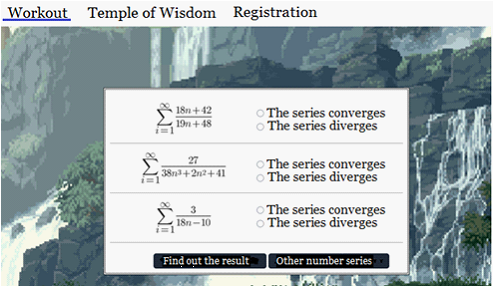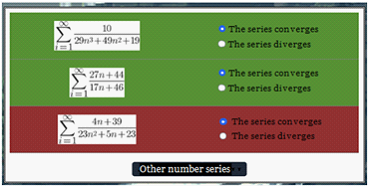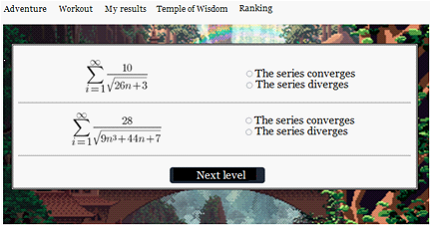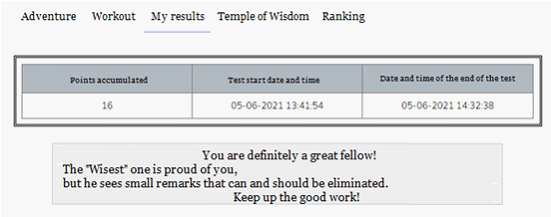Abstract
The paper dwells on the effectiveness of using computer games in learning. A review of current research on gamification in education, one of the most actively developing approaches, which is widely used in pre-school and school education, as well as at universities and for adult learning, is carried out. The authors also continue their research on the effectiveness of gamification methods in learning, using a specially designed web game as an example. The web application is used to practice the study of numerical series for convergence property and to control knowledge of numerical series. The positive impact of the web game ‘Convergence of Numerical Series’ on learning is noted. As a result of the experiment, where 68 technical students participated, an increase of more than 11% in the number of students showing a high level of mastering the material is observed. In addition, the students participating in the experiment show increase motivation and engagement in the educational environment. However, it is necessary to keep in mind the proper integration of games in education, not to get carried away too much so as not to ‘play too much’. Learning games should generate further reflection and activities outside the computer. To make learning games in mathematics effective, high-quality development of such games using good design elements is necessary; innovative educational solutions that facilitate learning mathematics
Keywords: Educational game, game-based learning, gamification, mathematics education, web-game
Introduction
No sphere of human activity is growing and developing as extensively as computer science. And the education system is facing the task of applying modern educational technologies to develop the required competencies.
Probably one of the most controversial means of solving this situation is computer games and gamification of education, which is widely used both in school education and universities. Gamification of education is an evolving approach to increase students’ motivation and engagement by incorporating game design elements into the educational environment.
Many researchers note that the application of gamification in education has a positive impact on learners’ motivation (Safapour et al., 2019; Rosillo & Montes, 2021), which ultimately improves their learning outcomes (Broza & Kolikant, 2020; Es-Sajjade & Paas, 2020; Kebritchi et al., 2010). It is stressed that there is a need to expand the use of games as mediating elements in the learning of STEAM (Science, Technology, Engineering, Arts and Mathematics), that games contribute to scientific and mathematical enculturation (Fernández-Oliveras et al., 2021).
However, several researchers are critical of the process of introducing game forms in education. They point out the ambiguous success of gamification in educational contexts. A thorough review (Dichev & Dicheva, 2017) attempts to find out the research in this area, focusing on empirical evidence rather than capabilities, beliefs or preferences. The paper discusses the gamification mechanisms used, types of gamification activities by learning and research objectives. The authors conclude that
(i) there is insufficient evidence to support the long-term benefits of gamification in educational contexts; (ii) gamification practice has outpaced researchers’ understanding of its mechanisms and methods; (iii) knowledge of how to gamify activities according to the specifics of educational contexts is still limited. (Dichev, & Dicheva, 2017, p. 1)
Consequently, systematic research is required to prove the educational benefits of gamification for gamified learning to become an approved learning approach. The true potential of educational games to enhance learning outcomes and motivation should be investigated. The theoretical foundations of educational games should be improved (Es-Sajjade & Paas, 2020).
Problem Statement
Web-based learning games are gradually entering learning at all levels of education, from kindergarten to university. Currently, there are many educational platforms such as LinguaLeo (for learning and practising a foreign language), CodeCombat (for learning programming languages), Learningapps.org (service to guide teaching or self-studying process with interactive modules), CodinGame (a resource with a collection of free games with puzzles and algorithmic problems).
Recent research confirms the potential of game-based learning of mathematics. The acquisition of mathematical skills is believed to be crucial for modern society, and inadequate mathematical skills may be even more harmful to career prospects than drawbacks in reading or spelling (De Gloria, 2015). Therefore, using computer games may be the key to meaningful mathematics learning among low achievers (Broza & Kolikant, 2020).
Learning computer games provide emotional involvement and enjoyment of the learning process (Gutica & Petrina, 2021) and allow students to develop a more positive attitude towards learning mathematics (Ke, 2008).
Gamification and learning computer games are also applicable to university education, taking into account students’ professional fields (Tuparova et al., 2020). For example, by making the Web Game On Descriptive Statistics (WGODS) pleasant, simple, easy and useful, learning is improved on quantitative and qualitative data (Salas-Rueda et al., 2020).
There is a growing interest in education and learning in SeriousGames, which using the latest modelling and visualization technologies can contextualize the player’s experience in complex, realistic environments, supporting situational cognition (De Gloria et al., 2014).
Research Questions
Our study continues the work of (Eyrikh et al., 2019; Eirikh et al., 2021). The authors actively use gamification elements in the construction of Mathematics courses for Engineering students. Interactive computer games, such as Find the cross-sectional area of the river and Find the area of shadow, allow diversifying learning, which significantly increases the motivation of educational activities. The Integral Test 1.0 interactive simulator for practising the skills of finding primals can replace the routine checking of standard examples and partially make the teacher’s workload easier (Eirikh et al., 2021).
Numerical series is taught using a web game designed specifically for training and educational purposes using the following software tools Laravel php framework, local Open Server web server, integrated PHP development environment PhpStorm, collaborative development web service GitHub. A visual database design tool, MySQL Workbench, was used to create the database.
Purpose of the Studу
The purpose of the article is to find out the effectiveness of a specially designed web-game used in learning for practising the study of numerical series for convergence and controlling knowledge on the topic ‘Numerical series’.
Research Methods
The game starts with the home page, which contains a welcome message from the Wisest, describes the benefits of the game, and lists the technical support email and developers. From the home page, you can either go to the guest session by pressing the Try button (Figure 1) or start registration/authorization in the system using the Login/Register buttons immediately.

The following functions are available in guest mode: numerical series convergence study the skills, revise the theory and study the methodological guidelines in the, going to the (Figure 2). In the, the system gives out three numerical series templates randomly selected from the database, which should be investigated for convergence. The system generates and selects coefficients in the templates randomly according to the given constraints.

The result of the training session is displayed immediately after pressing the Learn result button. If the answer is correct, the line is highlighted in green, if not, it is highlighted in red. (Figure 3).
To enter the game, the student should register by filling in the following fields: login, first and last name, patronymic, email (required to the password reset), a password and password confirmation. A teacher can also register in the system, for this purpose it is necessary to tick the box

The student logged into the game has access to the following pages: The main objective is to complete, which has five levels and defeat. At each level, the number of given numerical series to be examined for convergence increases (Figure 4). The final fifth level of contains ten numerical series.

All stages of are limited to one attempt (only the instructor can authorize a second attempt), so on the start page, the user is invited to visit theand.
After completing all the stages of, the system displays the number of points achieved and a welcome message from the, who assesses the result (Figure 5).

There is a summary table on the page where each player can see his/her score compared to the other players who have completed (Figure 5).

Findings
The web-game was used in learning in the academic year 2020-2021 at Sholom-Aleichem Priamursky State University and Pacific State University. In the experimental group of 35 students, when studying the topic, the students had to go through. In the control group of 33 students, the web-game was not used in studying this topic.
Both groups were initially comparable in the level of mastering the topic preceding the study of (Table 1).
After the experiment, students in both groups did the same summative test, which checked the degree of mastering skills in studying numerical series for convergence. The results showed that in the experimental group the percentage of students who demonstrated a high level of mastery of the material increased by more than 11%. While in the control group the percentage increased not significantly (Table 2). Also, the students in the experimental group showed increased intrinsic motivation to learn.
Considering the growing popularity of gamification and the confused success of its application in the educational environment, this experiment is going to be continued in the current academic year, increasing the number of participants.
Conclusion
Thus, the use of a web-game in learning has improved students’ educational achievements and influenced their intrinsic motivation to learn.
All in all, the introduction of gamification methods in education makes it possible to change the presentation of information, to organize the learning according to students’ needs, which increases students’ creativity and has a positive impact on the overall level of education. In addition, learning games in mathematics can be considered as assessment tools.
However, not every computer game is capable of engaging hard learning in mathematics. It is necessary to keep in mind the proper integration of games in education, not to become keen on too much so as not to get absorbed in playing. Learning games should generate further reflection and activity outside the computer.
To use mathematics learning games effectively, it is necessary to develop high-quality games using good design elements; innovative educational solutions that facilitate learning mathematics. Only then can a computer game provide emotional involvement, enjoyment of learning, and increased achievement levels.
Acknowledgments
The authors would like to thank Marina Streltsova and Alexander Marinchuk, graduates of Sholom-Aleichem Priamurskiy State University, who designed the software game coding for the web application (Certificate of state registration of a computer program № 2021661137 Russian Federation).
References
Broza, O., &Kolikant, Y. B. (2020). The Potential of Rich Digital Game-Based Learning Environments to Promote Low-Achieving Students' Participation in Mathematics. International Journal of Game-Based Learning (IJGBL), 10(4), 40-54.
De Gloria, A. (2015). Special Issue on Digital Games for Learning Mathematics. International Journal of Serious Games, 2(1). DOI:
De Gloria, A., Bellotti, F., & Berta, R. (2014). Serious Games for education and training. International Journal of Serious Games, 1(1). .DOI:
Dichev, C., & Dicheva, D. (2017). Gamifying education: what is known, what is believed and what remains uncertain: a critical review. International Journal of Educational Technology in Higher Education, 14, 9. DOI:
Eirikh, N., Markova, N., & Matveeva, E. (2021). Interactive Computer software as an effective tool for blended learning. European proceedings of social and behavioural sciences, 111, 272-278.
Es-Sajjade, A., & Paas, F. (2020). Educational theories and computer game design: lessons from an experiment in elementary mathematics education. Educational Technology Research and Development, 68, 2685–2703. DOI:
Eyrikh, N. V., Fishman, B. E., Bazhenov, R. I., Markova N. V., & Pitsuk I. L. (2019). Hands-On Games for Motivating Students' Math Training. Proceedings of the 2019 IEEE International Conference Quality Management, Transport and Information Security, Information Technologies IT and QM and IS 2019, 477-481. DOI:
Fernández-Oliveras, A., Espigares-Gámez, M. J., & Oliveras, M. L. (2021). Implementation of a playful microproject based on traditional games for working on mathematical and scientific content. Education Sciences, 11(10), 624. DOI:
Gutica, M., & Petrina, S. (2021). Emotional agents in educational game design: Heroes of math island. International Journal of Game-Based Learning, 11(4), 72-89. DOI:
Ke, F. (2008). A case study of computer gaming for math: Engaged learning from gameplay? Computers & Education, 51, 1609–1620. DOI:
Kebritchi, M., Hirumi, A., & Bai, H. (2010). The effects of modern mathematics computer games on mathematics achievement and class motivation. Computers & Education, 55(2), 427–443.
Rosillo, N., & Montes, N. (2021). Escape room dual mode approach to teach maths during the covid-19 era. Mathematics, 9(20), 2602. DOI:
Safapour, E., Kermanshachi, S., & Taneja, P. (2019). A Review of Nontraditional Teaching Methods: Flipped Classroom, Gamification, Case Study, Self-Learning, and Social Media. Education Sciences, 9(4), 273. DOI:
Salas-Rueda, R. A., Salas-Rueda, E. P., & Salas-Rueda, R. D. (2020). Analysis and design of the web game on descriptive statistics through the ADDIE model, data science and machine learning. International Journal of Education in Mathematics, Science and Technology (IJEMST), 8(3), 245-260.
Tuparova, D., Tuparov, G., & Orozova, D. (2020). Educational computer games and gamification at the higher education - students' points of view. Paper presented at the 2020 43rd International Convention on Information, Communication and Electronic Technology, MIPRO 2020 - Proceedings, 1579-1584. DOI:
Copyright information

This work is licensed under a Creative Commons Attribution-NonCommercial-NoDerivatives 4.0 International License.
About this article
Publication Date
03 June 2022
Article Doi
eBook ISBN
978-1-80296-125-6
Publisher
European Publisher
Volume
126
Print ISBN (optional)
-
Edition Number
1st Edition
Pages
1-1145
Subjects
Social sciences, education and psychology, technology and education, economics and law, interdisciplinary sciences
Cite this article as:
Eyrikh, N. V., & Markova, N. V. (2022). Web-Games As A Tool For Teaching Maths At University. In N. G. Bogachenko (Ed.), AmurCon 2021: International Scientific Conference, vol 126. European Proceedings of Social and Behavioural Sciences (pp. 273-280). European Publisher. https://doi.org/10.15405/epsbs.2022.06.31

